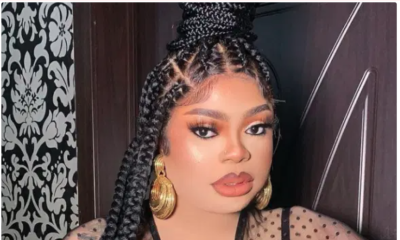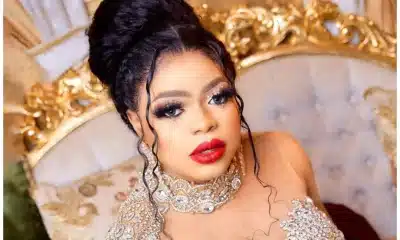Lifestyle
Nigerian Youths And Cross-dressing Culture In Nigeria

It is a fact that cross-dressing culture is more common than ever in Nigeria and the rest of the World. Simply put, cross-dressing is the act of a person wearing clothing traditionally or stereotypically meant for a different gender.
From pre-modern history, cross-dressing has been practised to disguise, comfort, entertain, and express oneself.
Even in Nigerian society, there are cross-dressers. Cross-dressers come in various forms, each with a unique motivation for engaging in these behaviours.
The media influences public opinion about problems, events, happenings, or people since cross-dressers were previously not widely accepted in society due to cultural norms and values, but now they are well-publicised as a result of media attention.
Advent Of Cross-dressing In Nigeria
Before the rise of today’s cross-dressers in the country, Nigeria had its pioneer back in the 1970s, with Uzoma Odimara, better known as Area Scatter, becoming the first Nigeran cross-dresser.
On normal days, Odimara was a civil servant, but on other days, he dressed like a woman with braided hair and pierced ears and walked the streets of Imo. He was also a skilled musician who was invited to events and parties to perform and had many television appearances.

Apart from Area Scatter, there was also the Calypso King in the 1980s who believed that he was a woman. He was an actor and singer who later got married to a woman and had children to prove that he was not impotent. Left to him, he would have married a man. He also wanted to cut off his genitals and change his sex.
In the Northern part of Nigeria, especially in cities like Kano and Katsina, there are many effeminate men called Yan Daudu, meaning men who act like women.
Modern cross-dressing started with Denrele Edun, a popular TV host who was popular in the 2000s for his high-heeled shoes, elaborate hairdo, makeup, and painted nails. Despite his feminine outfits, Denrele does not accept the cross-dresser tag.
Nowadays, we have so many crossdressers, Bobrisky leading the pack, followed by James Brown and Jay Boogie. These men have transformed their bodies to look like women.

Prohibition Of Cross-dressing In Nigeria
In 2022, a member of the House of Representatives, Hon. Muda Umar Muda, introduced a bill to prohibit cross-dressing in Nigeria for the first reading on the floor of the Green Chamber.
The bill, which was an amendment to the Same Sex Prohibition Act (2023), proposed that cross-dressing, whether done privately or publicly, should be prohibited.
The lawmaker also proposed a six-month imprisonment or a fine of N500,000 for anyone found guilty.
However, in December 2023, this bill failed to pass a second reading. The then Deputy Speaker of the House, Ahmed Wase, advised the bill’s sponsor to step down as it does not capture the country’s multi-cultural nature.
Police Speak On Cross-dressing Culture In Nigeria
The Nigeria Police Force (NPF) has said that there is no provision in the law suggesting that crossdressers in the country should be arrested or jailed for their actions.
The Force Spokesman, ACP Olumuyiwa Adejobi, stated this in a recent interview on Channels Television’s Politics Today amid some debates on social media about crossdressing and sexuality.
Adejobi asserted the crime for which people get arrested has more to do with natural offences or crimes against nature, saying that the police cannot arrest anyone for cross-dressing.
He opined that certain cases are hard to prove without evidence, and as such, many who cross-dress are often accused of other crimes, and until proof is found, these individuals cannot be kept behind bars.
Adejobi said: “I have not read anywhere that cross-dressing is an offence in Nigeria…. Let us be reasonable: you cannot arrest somebody you want to prosecute without having credible evidence, and as such, cross-dressing is not yet a crime in Nigeria.
“Some of them who are into cross-dressing are alleged to be into something else. That’s where the problem lies. We need to have enough proof that they are actually into ‘that’. All those offences are natural offences in Nigeria, and they are punishable under our laws.”

Lawyer Speaks On Cross-dressing Culture In Nigeria
In an exclusive interview with Naija News, a Lagos-based lawyer, Kehinde Adetola Adeyemi, stated that cross-dressing is not part of any culture of any tribe in the country.
The lawyer opined that there are an insignificant number of disoriented individuals with largely disillusioned followers online involved in cross-dressing in Nigeria. He added that Nigerians now live in a morally bankrupt society.
He said: “Cross-dressing is the headache of anybody who intends to soothe himself or herself in the publicly accepted attire of the opposite gender, and without being reticent, I would say that such a resolution of the individual should not be tolerated. Ideally, it should be a thing of irritation in any upright society, but anything goes is the saying.
“Culture is the ideas, customs, and social behaviour of a particular people or society. So, is cross-dressing a culture of any society in our country? The answer is no. What we have is just an insignificant number of disoriented individuals with largely disillusioned followers with mobile data in a free space promoting their immorality, probably because no law criminalizes their act.
“I think unregulated social media and the forgetfulness of our lawmakers to punish cross-dressing and transgender in the Same-Sex Marriage Prohibition Act of 2013 remain one of the key reasons why we are now seeing an increase in cross-dressers in Nigeria. One thing is that you really cannot separate cross-dressing from same-sex entanglement. So the law should be amended to capture this concerning trend.”
Speaking further, Adeyemi stated that Bobrisky is more than a negative influence on Nigerian youths and an avatar of deception, whose lifestyle should not be encouraged.
He said: “Bobrisky would not have been a negative influence on anyone but for unregulated social media, clout chasing and flagrant bad conscience of his patronage and supporters. He is more than a negative influence. Bobrisky is an avatar of deception to even his own esteem. We are no doubt in a morally bankrupt society, but I don’t think anyone of noble birth should be seen fancying cross-dressing or a cross-dresser except for the purpose of skit-making and stage plays.
“It is no longer news that He was arrested by the EFCC for an offence punishable under section 21 of the CBN ACT, and I have heard many people say, ‘Oh! It is a witch hunt because he is a cross-dresser and many other rumours. As a matter of fact, this blabbermouth who thinks himself to be a VeryDarkMan believed that Bobrisky’s current tribulation is his handwork, but this is not so. Bobrisky was arrested and sentenced for spraying and mutilation of the Naira.
“He pleaded guilty at the earliest possible time, and the Court gave its verdict. Contrary to public sentiment, the Judge gave him an equitable and temperate sentence. I say this because section 21 of the CBN ACT says that spraying of, dancing or matching on the Naira or any note issued by the Bank during social occasions or otherwise howsoever shall constitute abuse and defacing of the Naira or such note and shall be punishable on conviction to imprisonment for a term not less than six months or to a fine not less than N50, 000:00 or to both such fine and imprisonment.
“If you read this without bias, even if you are not a lawyer, you will see that the law says … for a term not less than 6 months or to a fine not less than 50k or both. So, the court could have sentenced the Convict, Bobrisky now, to more than 6 months imprisonment with even a fine of 1 million naira or both. Looking at what he gets, the court has bestowed on him a very mild sentence. This is the law as we speak, and the court cannot do otherwise. Moreso Judges don’t make laws, lawmakers do. The castigation on either the EFCC or the Court is in crass ignorance by anyone doing so. We all can say that the punishment is harsh. I agree with that, but that is what we have in the Laws of the Federal Republic of Nigeria. Let us call the attention of our lawmakers to a compelling and immediate amendment of the harshness of section 21 of the CBN Act.”
Speaking on the position of the law regarding cross-dressing, transgender and homosexuality, Adeyemi said: “Except for homosexuality, which is expressly punished in section 5 of the Same-sex Marriage (Prohibition) Act, there is currently no legislation or executive order prohibiting cross-dressing and transgender activities in Nigeria. As such, those who engage in it can neither be arrested nor prosecuted for it since it is not an offence under any laws.
“Since there is no law punishing cross-dressing currently, we are left with questions of whether it is permissible morally or within any of our religions. We all know the answer, and I think everyone should just do what is right and not be indifferent about it. In a sober reflection, as humans of virtue and contentment, nobody wants to be a symbol or specimen of faux pas.”
The question remains whether the Nigerian government should ignore it or uphold religious convictions considering the country’s long history of cross-dressing.










